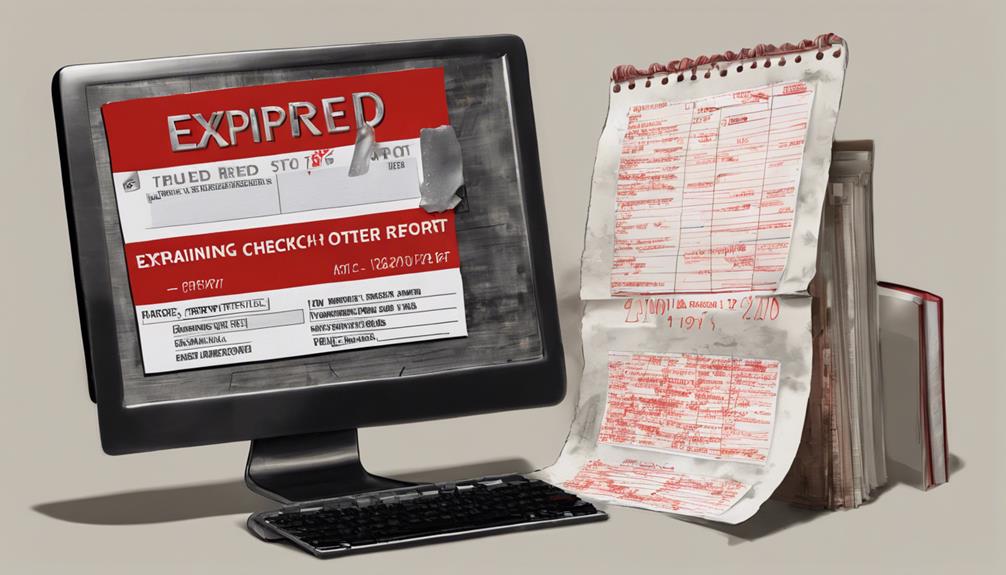Background checks do not typically display Social Security Numbers in their reports. They internally employ SSNs for verification while respecting candidate privacy. The focus is on relevant pre-employment screening data.
Key Takeaways
- SSN Trace in background checks uses SSNs internally for verification.
- Employers do not disclose SSNs in final reports to protect privacy.
- SSNs are crucial for accurate identity verification during screenings.
- Background screening agencies securely store SSNs for validation purposes.
- SSNs play a vital role in confirming identities without exposure in reports.
SSN Trace Explained

The SSN Trace process reveals vital details about an individual's Social Security Number. It includes information such as the SSN issuance date, associated names, address history, and the state where the number was issued.
While the SSN Trace doesn't confirm ownership of the SSN, it plays a significant role in verifying an individual's identity and providing context for further background checks. Utilizing the SSN Trace results can aid in conducting thorough screenings of individuals.
It's important to note that the information obtained from the SSN Trace can vary depending on the conducting agency and the specific data sources they've access to.
Employers often use the results of the SSN Trace to pinpoint jurisdictions for more detailed searches, helping them make informed decisions during the hiring process.
Importance of SSN Traces
Revealing important details such as issuance dates and associated names, SSN traces play a key role in bolstering background screening processes. These traces are integral components of thorough background screenings as they provide essential information for verifying candidate identities.
By analyzing SSN traces, discrepancies in provided information can be pinpointed, aiding in the verification process. Employers rely on SSN traces to validate the accuracy of the data provided by candidates, enhancing their pre-employment verification processes.
The information obtained from SSN traces not only helps in confirming the legitimacy of the SSN but also assists in establishing the authenticity of the individual's identity. This meticulous verification process significantly contributes to maintaining the integrity of the hiring process and mitigating the risks associated with hiring unverified candidates.
Essentially, SSN traces play a crucial role in fortifying background checks by verifying candidate identities and validating the accuracy of provided information.
Details Revealed by SSN Trace

SSN Traces provide detailed information that includes the date and state of SSN issuance, associated names and aliases, as well as recent address history. This information is essential for verifying the authenticity of the SSN and enhancing the depth of background screening processes. By revealing associated names and aliases, an SSN Trace helps in identifying individuals who may have used different names in the past. Additionally, the recent address history disclosed by an SSN Trace enables targeted background checks in specific locations. Moreover, SSN Traces flag inconsistencies such as mismatched details or unrelated names, prompting further investigation to ensure the accuracy of the information. This comprehensive data obtained from an SSN Trace plays a vital role in ensuring thorough background screenings and validating the information provided by individuals.
| Details Revealed by SSN Trace | |
|---|---|
| Date of SSN Issuance | State of Issuance |
| Associated Names | Aliases |
| Recent Address History | |
| Inconsistencies | Background Screening |
| Authenticity | Depth |
Conducting an SSN Trace Check
When conducting an SSN Trace Check, individuals can obtain important details such as the year of SSN issuance, state of issuance, associated names, and address history. This process is vital for verifying individual identities and enhancing the accuracy of background checks.
While SSN Trace results don't directly confirm SSN ownership, they provide a foundation for further verification. Employers often use SSN Trace to identify specific jurisdictions for more detailed criminal record searches, aiding in thorough pre-employment screenings.
Additional Insights on SSN Traces

During an SSN Trace, details such as issuance year, state, associated names, and recent address history are typically revealed. These SSN Trace results offer additional background for SSN verification and serve as a valuable context for identity verification checks.
While the SSN Trace itself doesn't confirm SSN ownership, it's a vital component of pre-employment screening procedures, aiding in enhancing background checks. The associated names and address history linked to the SSN provide essential information for employers to verify the identity of potential hires thoroughly.
However, for a thorough screening, additional identity verification checks may be necessary post SSN Trace. It's important to note that the specific information obtained through an SSN Trace can vary depending on the agency conducting the search.
Employers rely on SSN Traces to establish a foundational understanding of an individual's background, setting the stage for further identity verification processes in the hiring process.
Benefits and Drawbacks of SSN Trace
SSN trace offers valuable insights into a candidate's SSN history, names associated, and past addresses.
However, it falls short in confirming SSN ownership, leaving room for potential discrepancies.
Employers benefit from the detailed data provided by SSN trace but should be aware of its limitations in verifying true identity.
SSN Trace Importance
Utilizing SSN Trace during background checks offers essential insights into a candidate's identity and history, aiding in fraud prevention and accurate screening processes. SSN Trace plays a pivotal role in verifying an individual's identity and preventing identity theft by cross-referencing provided information with official records. It helps uncover any discrepancies in candidate details, prompting further investigation to ensure the accuracy of the background check results. Moreover, SSN Trace assists in correlating criminal records with the correct individual, enhancing the overall screening process. The inclusion of associated aliases and address histories from SSN Trace provides a more comprehensive view of the candidate, enabling better-informed hiring decisions. However, it's important to note that while SSN Trace offers valuable data, confirming SSN ownership may necessitate additional verification steps to validate the information provided.
| Benefits of SSN Trace | Drawbacks of SSN Trace |
|---|---|
| Verifies identity | Does not confirm SSN ownership |
| Prevents identity theft | May require additional verification steps |
| Identifies discrepancies | |
| Correlates criminal records | |
| Provides aliases and address histories |
SSN Trace Limitations
An important aspect when utilizing SSN Trace in background checks is understanding its limitations regarding identity verification. While SSN Trace reveals SSN issuance details, associated names, and address history, it doesn't definitively confirm SSN ownership. This tool proves valuable in uncovering inconsistencies in candidate information, aiding employers in conducting more thorough screenings.
However, the results of an SSN Trace can vary based on the conducting agency, potentially hindering conclusive identity verification. Employers can leverage SSN Trace to enhance background checks by identifying jurisdictions for further investigation. It serves as a fundamental first step in the screening process, yet it isn't reportable for FCRA purposes.
Despite its benefits in providing valuable insights, it's crucial to recognize the limitations of SSN Trace in achieving complete identity verification for thorough background checks.
Tips for Running a Background Check

When conducting background checks, utilizing Social Security Numbers (SSNs) can streamline the verification process and enhance accuracy. Employers should guarantee that they follow best practices when handling SSNs to maintain data security and compliance with regulations.
Understanding the significance of SSN visibility in checks can lead to more efficient and reliable background screening outcomes.
SSN Visibility in Checks
Background checks typically do not display Social Security Numbers (SSNs) in their reports to safeguard candidate privacy. While SSNs are essential for conducting SSN Trace background checks during pre-employment background screenings, they are not directly visible to employers. Instead, screening agencies use SSNs for verification purposes internally without disclosing them in the final reports provided to employers. The main focus of background screening is to deliver relevant information such as criminal history, employment verification, and credit checks to assist employers in evaluating a candidate's suitability for a position. By keeping SSNs private within the screening process, both the candidate's sensitive information and their privacy rights are respected.
| SSN Visibility in Background Checks | |
|---|---|
| SSN Trace Background Check | SSNs used internally for verification. |
| Employer Reports | Do not display SSNs; focus on relevant information. |
| Privacy Protection | SSNs kept confidential to respect candidate privacy. |
Background Check Best Practices
SSNs play a significant role in identity verification within background checks, guiding employers on the best practices for running thorough screenings. While SSNs are necessary for verifying and cross-referencing candidate information, they're typically not displayed in background check reports to protect candidate privacy and mitigate identity theft risks.
Employers may request SSNs to ensure accurate verification but should exercise caution in handling this sensitive information.
To run effective background checks, employers should prioritize verifying candidate identities through SSNs without compromising privacy. It's important to securely store SSNs and only use them for verification purposes during the screening process. Additionally, when reporting background check results, SSNs shouldn't be included to prevent any potential risks associated with identity theft.
What SSN Trace Shows
The information revealed by an SSN Trace includes details such as the SSN issuance date, state of issuance, associated names, and address history. This trace is a valuable tool used to verify identities, detect inconsistencies, and guide further background checks. While it doesn't confirm SSN ownership, it provides essential context for screenings.
The specifics of an SSN Trace report can vary depending on the conducting agency and available data sources. Employers often use the results of an SSN Trace to pinpoint jurisdictions for more detailed searches, enabling them to conduct more thorough background checks. By analyzing the SSN issuance date, associated names, and address history, employers can gain insights into an individual's background and potentially uncover discrepancies that may require further investigation.
This process aids in ensuring the accuracy and integrity of the screening process.
SSN Trace Process Overview

SSN trace involves searching various databases to uncover SSN issuance details, names, and address history. This process helps verify candidate information and identify any inconsistencies that may arise.
Understanding the SSN trace process is important for thoroughly evaluating an individual's background.
SSN Trace Explanation
In conducting background checks, a detailed SSN Trace process involves searching various databases to uncover information like SSN issuance, associated names, and address history. This step aids in cross-referencing candidate information for comprehensive background checks and plays a crucial role in pre-employment identity verification processes. While SSN Trace does not directly verify SSN ownership, it helps identify any inconsistencies in the details provided by the individual. The information obtained through an SSN Trace can vary depending on the agency conducting the check and the sources utilized.
| SSN Trace | Background Checks | Identity Verification |
|---|---|---|
| Uncover SSN details | Cross-reference data | Verify candidate identity |
| Identify names | Comprehensive checks | Validate provided info |
| Reveal address history | Pre-employment screening | Ensure data accuracy |
SSN Verification Importance
Verifying social security numbers through the SSN trace process plays a pivotal role in enhancing identity validation and screening accuracy. By conducting SSN verification, individuals can confirm important details such as issuance date, state, associated names, and address history. This process not only aids in validating SSN information but also helps in identifying potential discrepancies within candidate data, thereby improving the overall accuracy of background screenings.
It's important to note that while SSN trace doesn't directly confirm SSN ownership, it provides valuable context for further verification procedures. The results of an SSN trace can vary depending on the conducting agency, making it a fundamental initial step in thorough pre-employment verification processes. Incorporating SSN verification through the SSN trace process is essential for ensuring detailed identity validation and enhancing the overall accuracy of background screenings.
SSN in Background Checks
Conducting background checks includes a process that reveals essential details such as SSN issuance history and associated personal information. The SSN Trace is a fundamental component of pre-employment background checks, aiding in identity verification by cross-referencing candidate information. While it does not confirm SSN ownership, it provides valuable insights into the usage and history associated with the SSN. This step is vital as it helps identify any discrepancies or inconsistencies in a candidate's provided data, ensuring a more thorough screening process. Below is a table outlining the key aspects revealed through an SSN Trace:
| Key Aspect | Description |
|---|---|
| SSN Issuance Details | Date and location of SSN issuance |
| Associated Names | Names linked to the SSN |
| Address History | Historical addresses associated with the SSN |
Obtaining SSN-less Background Checks
SSNs are typically excluded from background check reports, ensuring privacy and security for individuals. When obtaining SSN-less background checks, individuals can rest assured that their sensitive information remains protected.
Here are three key points to keep in mind:
- Employers conduct SSN Trace services separately to verify individuals' SSNs without disclosing the actual number in the detailed background check report.
- The Social Security Administration plays an important role in providing legal information related to SSNs for identity verification purposes.
- While SSNs are necessary for conducting thorough criminal background checks, they aren't typically displayed in the final report shared with employers.
Frequently Asked Questions
Can Employers Check Your Social Security Number?
Employers can verify a candidate's social security number (SSN) through an SSN Trace in background checks. The SSN Trace provides issuance details, names, and address history to aid in accurate identification and prevent mistaken identity.
Can You Look Someone up by Their Social Security Number?
One cannot look someone up by their Social Security Number as it is restricted information for privacy and security reasons. Background checks do not display full SSNs but may use partial ones for verification.
Can a Background Check Be Run Without Ssn?
Can a background check be run without an SSN? Yes, it can. However, not providing an SSN may limit the depth and accuracy of the results. Employers might face challenges in obtaining thorough information, impacting decision-making.
What Shows Proof of Social Security?
Proof of social security is typically shown through documents like a Social Security card, W-2 forms, or tax returns. These provide verification of one's SSN for various purposes, including employment, government benefits, and financial transactions.
Conclusion
To sum up, carrying out a background check with an SSN trace can offer valuable insights into an individual's history. By uncovering significant details like alternate names, residences, and employment background, SSN traces are an essential tool for employers and landlords.
Remember to adhere to appropriate procedures and guidelines when conducting background checks to guarantee compliance with laws and regulations. Don't overlook the abundance of information that an SSN trace can offer in your screening process.









